I still remember the day I first heard the term “data engineering” – it was 2017, and I was struggling as a fresher working in TCS(Tata Consultancy Services) as support executive trying to get into meaningful project especially something related to Data. Fast forward eight years, and and I’ve seen this field explode into one of the most sought-after careers in tech. If you’re wondering what data engineers do and whether this career path is right for you, you’re in the right place. Whether you’re a developer like I was, a data analyst drowning in messy datasets, or a fresh grad trying to figure out your path, this guide will give you the real scoop on what data engineering actually involves.
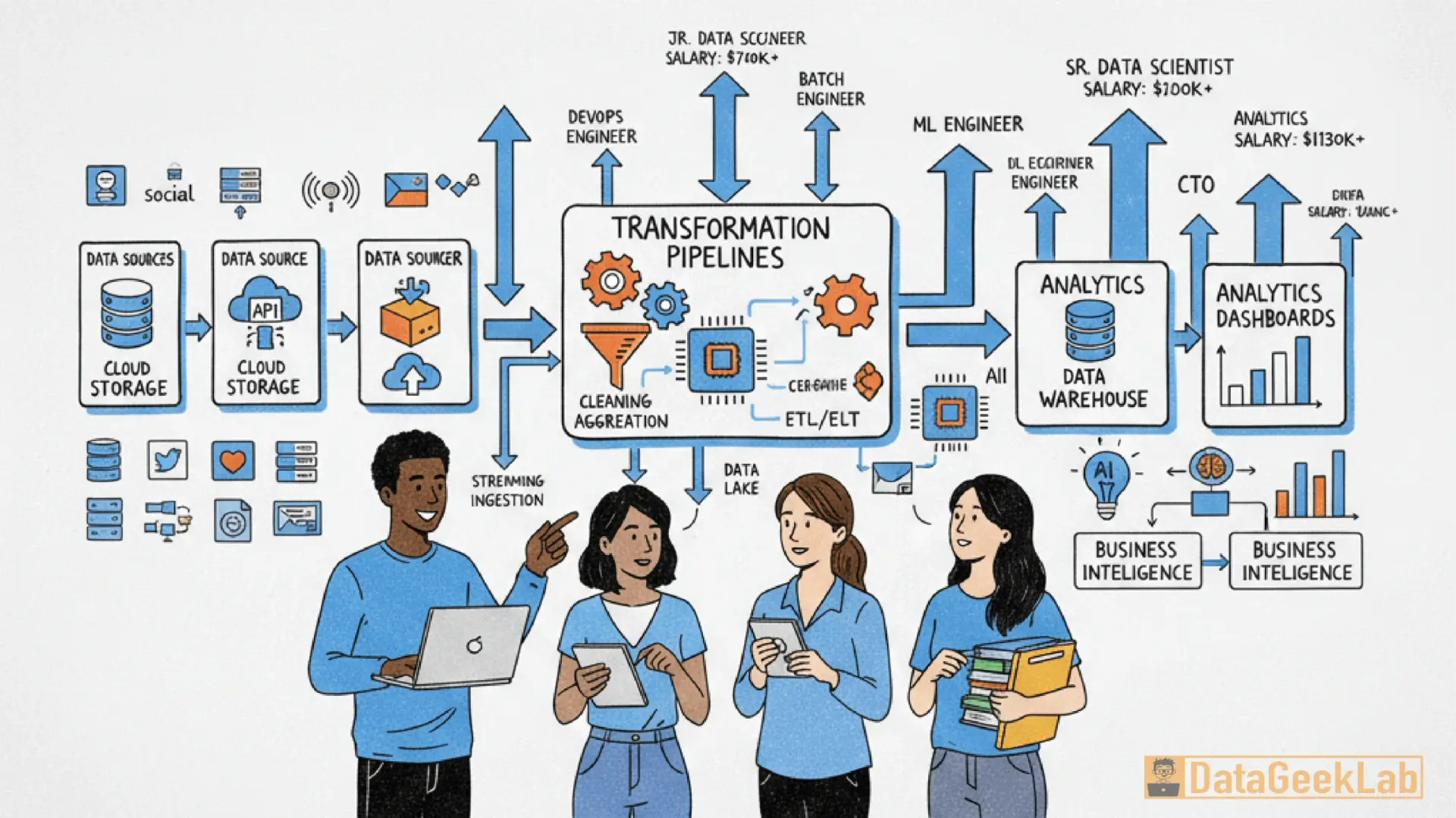
What is Data Engineering?
Here’s the thing about data engineering that took me way too long to understand: it’s basically the plumbing of the data world. Unglamorous? Maybe. Essential? Absolutely.
Before diving into what data engineers do specifically, let me paint the bigger picture. Data engineers are like the unsung heroes who make sure data flows where it needs to go, when it needs to be there, and in the right format. While everyone’s talking about AI and machine learning (which, don’t get me wrong, are cool), none of that fancy stuff works without solid data infrastructure underneath.
Data engineering is essentially building and maintaining the systems that collect, store, and prepare data for analysis. It’s the difference between having a bunch of random Excel files scattered across your company’s shared drives and having a clean, organised data warehouse where analysts can actually find what they need.
Real-World Example
Let me paint you a picture with Netflix (because who doesn’t love a good Netflix analogy?). You know how eerily accurate their recommendations can be? Like, sometimes I’m convinced they know me better than I know myself.
Well, that magic happens because of some seriously impressive data engineering work behind the scenes. This is a perfect example of what data engineers do in practice:
- They’re constantly collecting data on what you watch, when you pause, what you skip
- Processing millions of data points about streaming quality and user behavior
- Somehow making sense of all your weird viewing habits (yes, even that random documentary about competitive dog grooming you watched at 2 AM)
- Transforming all this messy data into something their recommendation algorithms can actually use
- Making sure everything works 24/7 because heaven forbid the recommendations go down during your weekend binge session
What Data Engineers Do: The Day-to-Day Reality ?
Okay, so you’re probably wondering: “What does a data engineer actually do all day??” Great question. I get this a lot from people considering the switch.
Honestly, it varies quite a bit depending on where you work, but here are the main things that’ll probably end up on your plate:
1. Building Data Pipelines (The Bread and Butter)
This is probably what you’ll spend most of your time doing. Think of pipelines as conveyor belts for data – they automatically move information from point A to point B, usually with some processing in between.
Real example from my last job: We had to build a pipeline that grabbed sales data every morning from our main database, cleaned it up (because trust me, real-world data is messy), calculated some metrics like which products were selling best, and dumped everything into our data warehouse so the business analysts could create their daily reports.
Sounds simple, right? Well, until the source system decides to change their data format without telling anyone. Fun times.
2. Data Architecture Design (Playing Digital Architect)
This is where you get to be the architect of the data world. You’re basically deciding how all the data pieces fit together – where stuff gets stored, how it flows between systems, and who can access what.
It’s like designing a city’s infrastructure, except instead of roads and water pipes, you’re dealing with databases and APIs. And just like city planning, if you mess this up early on, you’ll be dealing with the consequences for years.
3. Data Quality Management (The Detective Work)
This might be the most underrated part of the job, but it’s crucial. You’re basically a detective trying to figure out why the numbers don’t add up.
“Why are we showing negative sales for Tuesday?” “Where did all the customer records from last month go?” “Why does the same customer have three different spellings of their name in our system?”
You’ll be writing validation rules, setting up monitoring, and occasionally playing data therapist when stakeholders panic about weird-looking numbers.
4. Performance Optimisation (The Efficiency Game)
Remember that pipeline I mentioned? Well, it worked great when we had 1,000 customers. But when we hit 100,000 customers, suddenly it was taking 6 hours to run instead of 30 minutes.
This is where you become part detective, part magician. You’re constantly figuring out how to make things faster, cheaper, or both. Sometimes it’s as simple as adding an index to a database. Other times you’re completely redesigning how data flows through your system.
5. Collaboration (More Than You’d Think)
Here’s something they don’t tell you: you’ll spend a surprising amount of time in meetings. Data scientists will want their models fed in a specific way. Analysts need their reports by 9 AM sharp. Product managers want to track seventeen new metrics by next week.
You’re basically the translator between “I need this data” and “here’s how we can actually make that happen without breaking everything.”
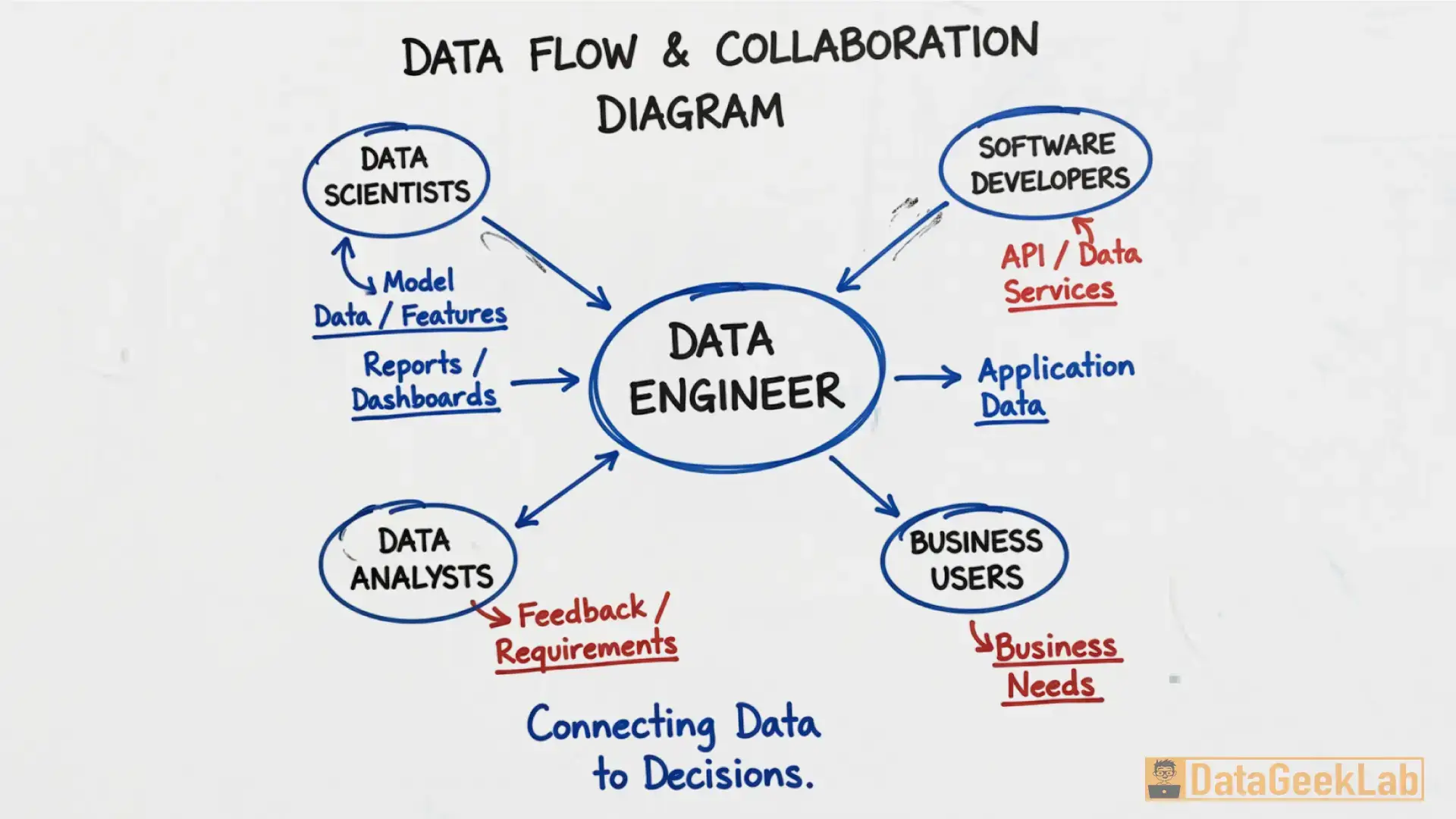
What Skills Do You Actually Need? (The Real Talk)
Alright, let’s get into the nitty-gritty. I’m going to be honest with you about what skills matter and what’s just nice-to-have. I’ve seen too many people get overwhelmed trying to learn everything at once.
The Must-Haves (Don’t Skip These)
Programming Languages
SQL – I cannot stress this enough. If you learn nothing else, learn SQL. I’ve interviewed candidates who knew Spark and Kafka but couldn’t write a basic JOIN. Don’t be that person.
Python – This is your Swiss Army knife. Most data engineering tools have Python APIs, and it’s just so versatile. Plus, if you’re coming from data analysis, you probably already know some Python.
Bash/Shell scripting – You’ll be automating a lot of stuff, and knowing your way around the command line is essential. I still remember the first time I had to debug a failing cron job at 2 AM – shell scripting knowledge saved my sanity.
Java/Scala – Honestly? You can probably skip these initially unless you’re planning to work heavily with Spark or Kafka. But they’re good to learn eventually.
The Big Data Stuff (Learn as You Go)
Here’s where people get intimidated, but honestly, you don’t need to know all of this on day one:
Apache Spark – Great for processing huge amounts of data. But start with pandas first, then move to Spark when you actually need it.
Apache Kafka – For real-time data streaming. Super useful, but not every company uses it.
Apache Airflow – This one’s actually pretty important for orchestrating your data pipelines. I wish I’d learned it sooner. Check out this article to learn Airflow in depth.
Hadoop – Honestly, it’s kind of old school now. Most companies are moving to cloud solutions.
Cloud Platforms (Pick One to Start)
Don’t try to learn all three at once. Pick the one your target companies use:
AWS – Most popular, lots of jobs. S3, Redshift, and Glue are the main ones to know.
Google Cloud – BigQuery is amazing for analytics. Seriously, once you use it, regular SQL databases feel slow.
Azure – Growing fast, especially if you’re targeting enterprise companies.
Databases and Storage
- Relational databases: PostgreSQL, MySQL, SQL Server
- NoSQL databases: MongoDB, Cassandra, DynamoDB
- Data warehouses: Snowflake, Redshift, BigQuery
- Data lakes: Understanding of structured and unstructured data storage
Soft Skills
- Problem-solving: Debugging complex data issues
- Communication: Explaining technical concepts to non-technical stakeholders
- Attention to detail: Ensuring data quality and accuracy
- Continuous learning: Staying updated with rapidly evolving technologies
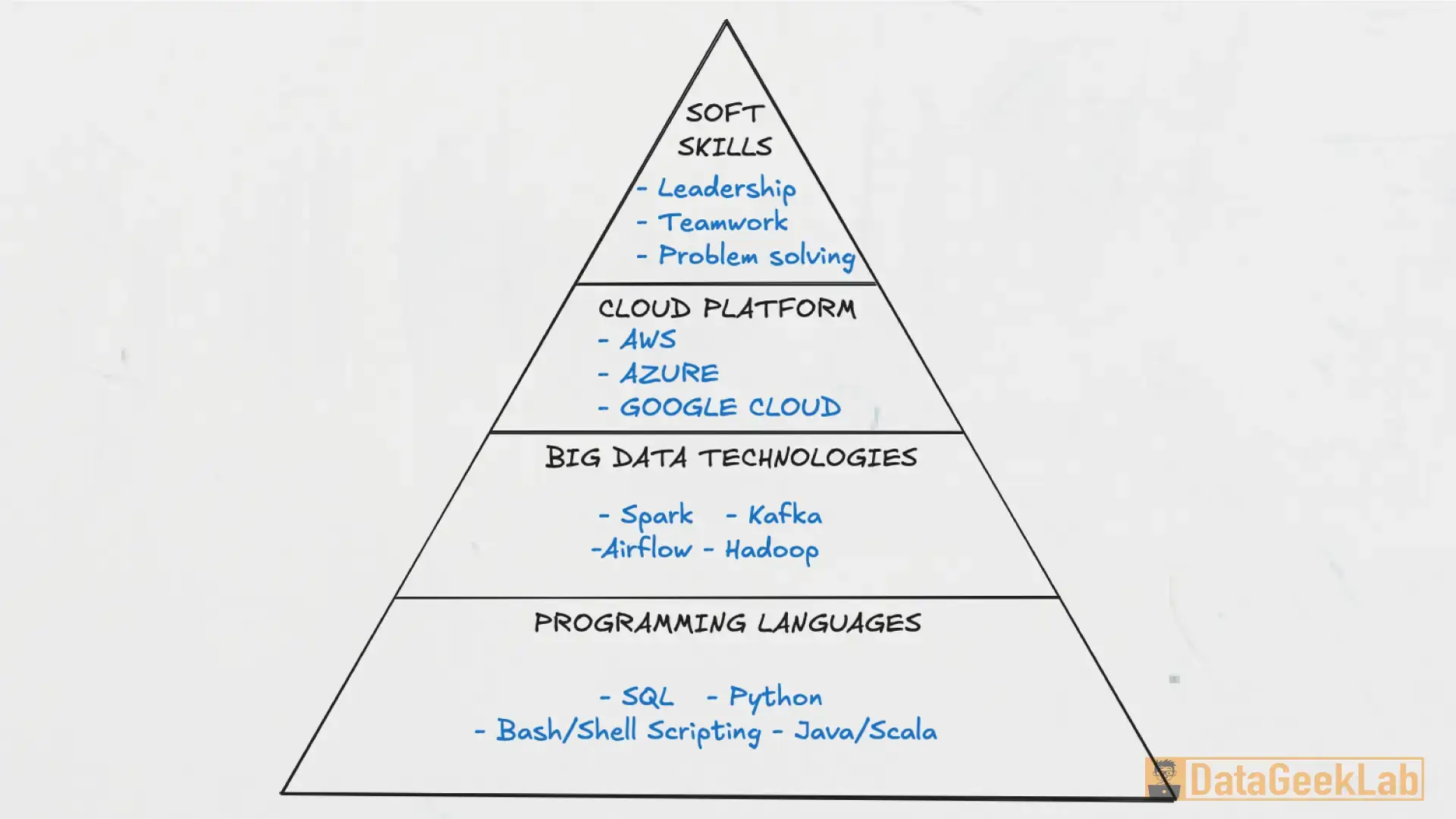
Question Everyone Asks – Do you need to know coding ?
Short answer: Yes, you absolutely need to code. But before you panic and close this tab, let me explain what that actually means and why it’s not as scary as you think.
Why You Can’t Escape the Code :
Look, I get it. Maybe you became a data analyst specifically to avoid heavy programming. But here’s the reality:
Everything is custom – Unlike web development where you can use WordPress, data engineering is mostly building custom solutions for specific business needs.
Automation is key – You can’t manually move data around every day. You need scripts that run automatically.
Integration nightmares – You’ll be connecting systems that were never meant to talk to each other. That requires code.
Scale matters – What works for 1,000 rows won’t work for 1 million rows. You need to write efficient code.
Honest Advice Based on Your Background
If You’re a Software Developer
You’re actually in a great spot! The programming part won’t be an issue. What you’ll need to wrap your head around:
- Data thinking – It’s different from building user-facing apps
- Database optimization – Suddenly query performance really matters
- Batch processing – Most data work happens in scheduled jobs, not real-time
I’ve seen developers struggle initially because they’re used to immediate feedback. In data engineering, you write a script, schedule it to run overnight, and hope it works. Debugging can be… interesting.
If You’re a Data Analyst/Scientist
You probably already know SQL and some Python, which is awesome. But you’ll need to level up your coding game:
- Production code – Your Jupyter notebook experiments need to become robust, scheduled jobs
- Error handling – What happens when your script fails at 3 AM?
- Testing – Yes, you need to test your data pipelines
The biggest mindset shift? You’re not just analyzing data anymore; you’re building the infrastructure that makes analysis possible.
If You’re Starting from Scratch
Don’t panic. Here’s your roadmap:
- Master SQL first – Seriously, spend 2-3 months just on this
- Learn Python basics – Focus on pandas, not web frameworks
- Get comfortable with the terminal – You’ll live here
- Learn Git – Because you will break things and need to undo them
The Career Ladder: What to Expect at Each Level
Let me break down what the career progression actually looks like, based on what I’ve seen (and lived through):
Junior Data Engineer (0-2 years) – The Learning Phase
This is where you’ll probably start, and honestly, it’s a great place to learn what data engineers do without too much pressure.
What you’ll actually be doing:
- Fixing broken pipelines (and there will be many)
- Writing simple ETL scripts under supervision
- Monitoring dashboards and alerting people when things go wrong
- Being the person who gets called when data looks weird
Real talk: You’ll spend a lot of time figuring out why something that worked yesterday suddenly doesn’t work today. It’s frustrating but incredibly educational.
Mid-Level Data Engineer (2-5 years) – The Sweet Spot
This is where things get interesting. You know enough to be dangerous, but not so much that you’re stuck in meetings all day.
What changes:
- You’re designing new systems, not just maintaining old ones
- People actually ask for your opinion on technical decisions
- You get to mentor junior engineers (which is both rewarding and terrifying)
- You start caring about things like “data governance” and “lineage”
The reality: You’ll become the go-to person for specific technologies or domains. Maybe you’re the “Kafka person” or the “AWS expert.” Embrace it.
Senior Data Engineer (5+ years) – The Strategy Phase
Now you’re making the big decisions. Congratulations, you’re also probably in a lot more meetings.
What you’re responsible for:
- Deciding which technologies the team adopts
- Designing systems that need to work for the next 3-5 years
- Explaining to executives why migrating to the cloud will take 18 months, not 3
- Managing people (if you want to)
The challenge: Balancing technical debt, new feature requests, and keeping the lights on. It’s like being a technical project manager who can still code.
Specialized Paths (Where You Might End Up)
Data Platform Engineer
You become the infrastructure guru. Think Kubernetes, Docker, and making sure the entire data platform doesn’t fall over.
Analytics Engineer
This is a newer role that’s becoming super popular. You’re basically building the bridge between raw data and business insights. Less infrastructure, more business logic.
ML Engineer
You focus specifically on machine learning pipelines. It’s data engineering, but with the added complexity of model training, deployment, and monitoring.
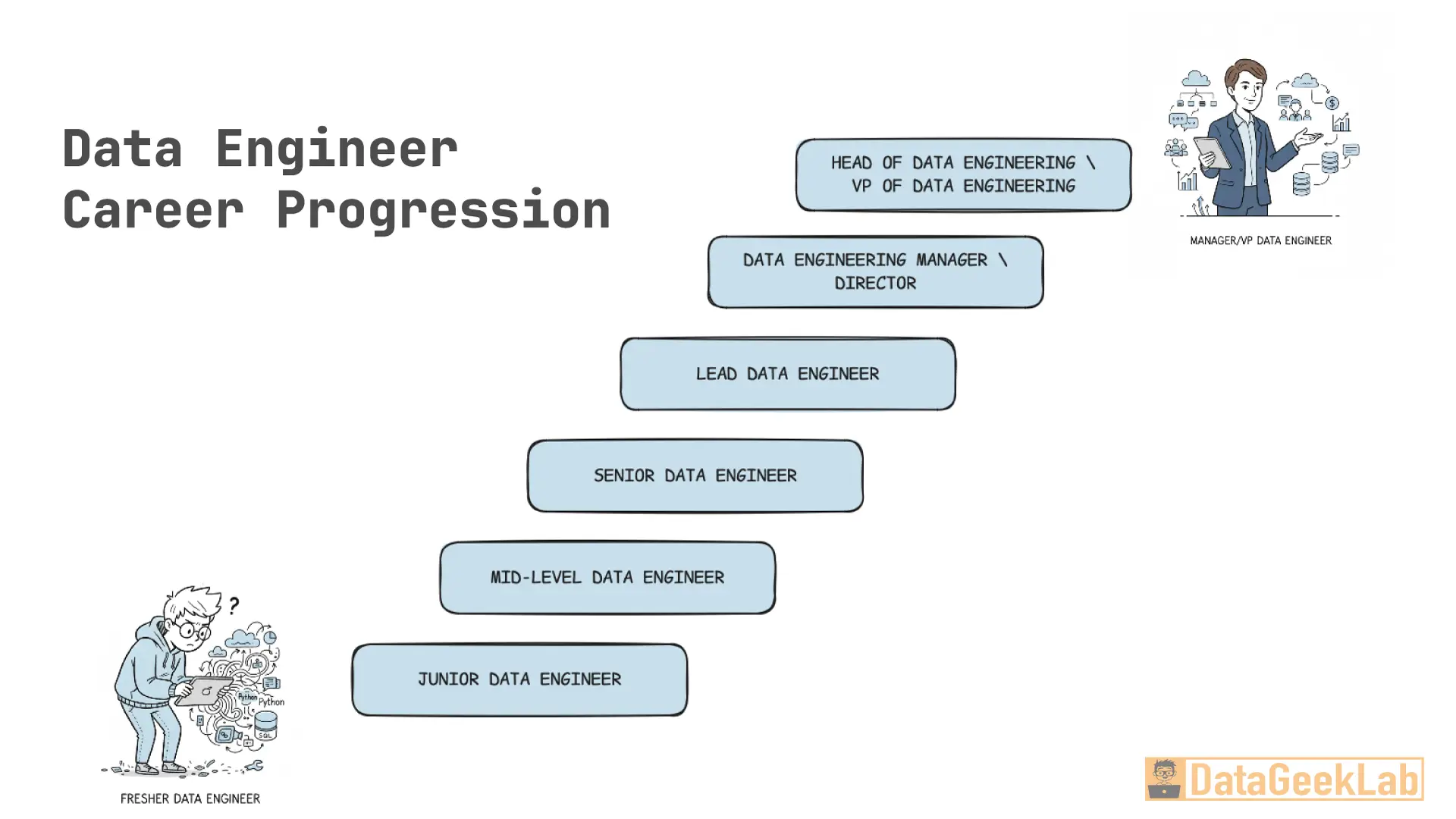
So, How Do You Actually Get Started ?
Alright, enough theory. Let’s talk about practical next steps based on where you’re coming from:
If You’re a Software Developer
You’ve got the hardest part (programming) down already. Now you need to understand what data engineers do differently from regular software development:
- SQL mastery – It’s different from application development
- Data modeling – Learn how to design databases properly
- Build a data pipeline project – Even a simple one that processes CSV files
- Learn a cloud platform – Pick AWS, GCP, or Azure and stick with it
If You’re a Data Analyst/Scientist
You understand data, now you need to learn engineering:
- Level up your Python – Move beyond pandas to production-quality code
- Learn version control – Git is non-negotiable
- Understand APIs – You’ll be integrating a lot of systems
- Build something end-to-end – From data ingestion to final output
If You’re Starting Fresh
To understand what data engineers do, you need to build these skills step by step:
- SQL first – Spend 2-3 months getting really good at this
- Python basics – Focus on data manipulation, not web development
- Cloud fundamentals – Most companies are cloud-first now
- Build projects – Start small, but make them real
My Suggested Learning Timeline (6-12 months)
Based on what I’ve seen work for people making the transition:
Months 1-2: Get really good at SQL. I mean really good. Window functions, CTEs, query optimization.
Months 3-4: Python for data + basic database design. Learn pandas, but also understand how databases actually work.
Months 5-6: Pick a cloud platform and learn the basics. Build your first real pipeline.
Months 7-8: Dive into orchestration tools like Airflow. Learn about data quality and monitoring.
Months 9-12: Specialize based on what interests you. Real-time streaming? ML pipelines? Data platform engineering?
Pro tip: Don’t try to learn everything at once. I see people get overwhelmed trying to master Spark, Kafka, and three cloud platforms simultaneously. Pick one thing, get good at it, then move on.
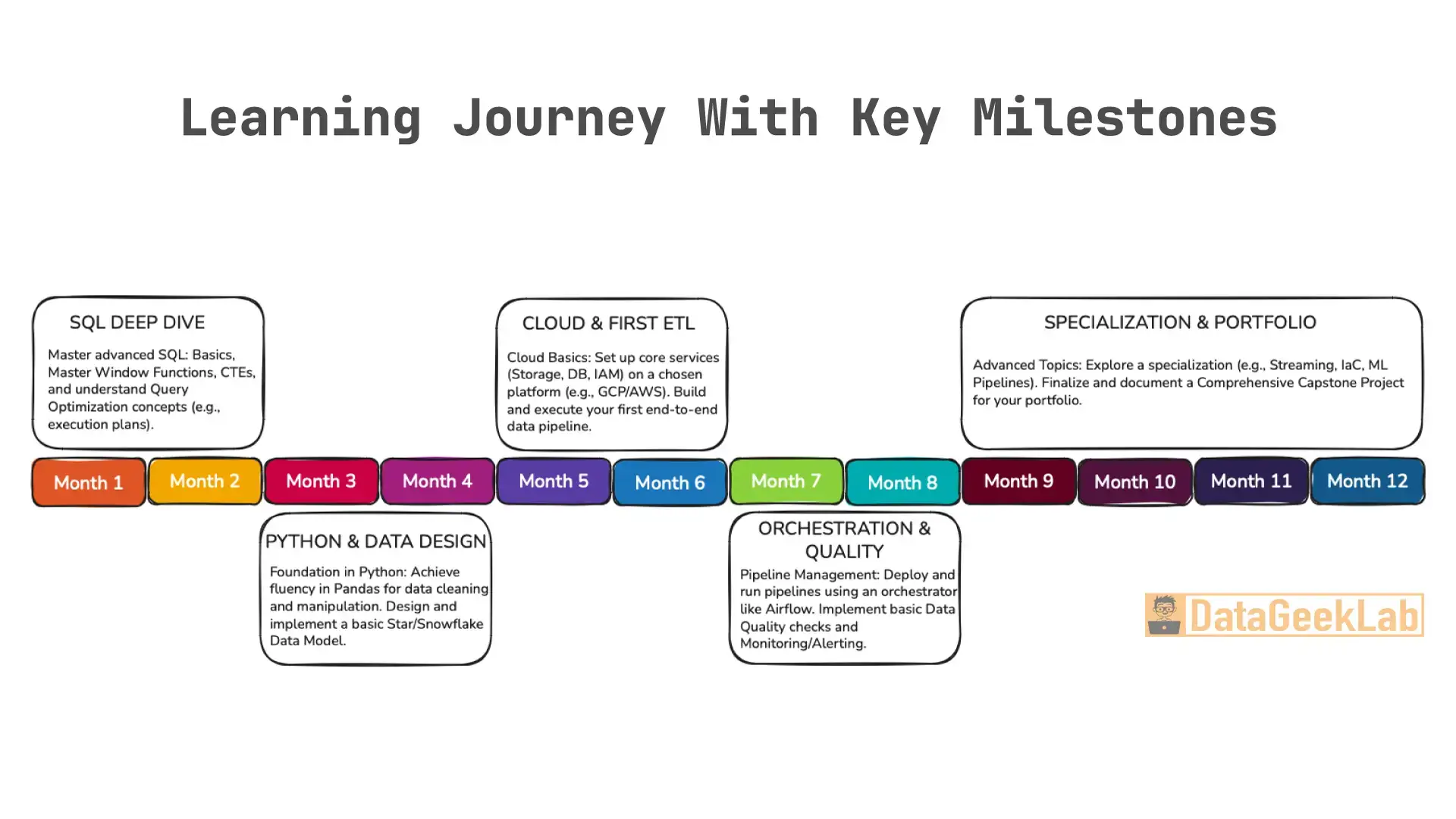
The Money Talk (Because Let’s Be Real)
Let’s address the elephant in the room: yes, data engineering pays well. Really well.
Why the high salaries?
- Supply and demand – There aren’t enough qualified data engineers
- Business impact – When data systems go down, companies lose money fast
- Complexity – It’s genuinely hard to do well
- Responsibility – You’re often responsible for systems that the entire company depends on
What You Can Actually Expect to Earn (US, 2024)
Junior (0-2 years): $80K – $120K
Mid-level (2-5 years): $120K – $160K
Senior (5+ years): $160K – $220K+
Staff/Principal: $220K – $300K+
Reality check: These numbers vary wildly based on location (SF vs. Austin vs. remote), company size (startup vs. FAANG), and industry. But even on the lower end, it’s solid money.
The remote situation: COVID changed everything. Most of what data engineers do can be done remotely, and companies have finally accepted this. You’re not tied to expensive tech hubs anymore.
The Stuff Nobody Warns You About
Let me share some challenges I wish someone had told me about when I started:
The Technology Treadmill
New tools come out constantly. Spark was hot, then Snowflake, now everyone’s talking about dbt and data mesh. It’s exhausting.
My advice: Learn the fundamentals deeply. SQL will outlast whatever trendy tool is popular this year. Understanding distributed systems concepts matters more than knowing the latest Kafka version.
Debugging Data Issues is… Special
When your web app breaks, users complain immediately. When your data pipeline breaks, you might not find out for weeks. Then you’re trying to figure out why the revenue numbers were wrong for the entire quarter.
Survival tip: Invest heavily in monitoring and data quality checks. Trust me on this one.
The “It Worked on My Machine” Problem, But Worse
Your pipeline works fine with 1,000 rows of test data. Then you run it on production with 10 million rows and everything falls apart. Scale changes everything in data engineering.
Reality: You’ll become very familiar with concepts like “backpressure,” “memory optimization,” and “why did this query take 6 hours to run?”
So, Should You Make the Jump ?
After learning about what data engineers do, you’re probably wondering: “Is data engineering actually right for me?”
Here’s my honest take. Data engineering is great if you:
- Love solving puzzles – Because that’s what debugging data issues feels like
- Don’t mind being behind the scenes – Data scientists get the glory, you keep the lights on
- Can handle ambiguity – Requirements are often vague, and you’ll need to figure things out
- Enjoy building things that last – The systems you build today will (hopefully) run for years
It might not be for you if:
- You need immediate feedback on your work
- You prefer working on user-facing features
- You get frustrated when things break for mysterious reasons
- You don’t like learning new technologies constantly
My Final Thoughts
I’ve been doing this for six years now, and I still love it. Understanding what data engineers do and actually doing it are two different things, but both are rewarding. Yes, it can be frustrating when a pipeline fails at 2 AM. Yes, the technology landscape changes constantly. But there’s something deeply satisfying about building systems that enable entire organizations to make better decisions.
Plus, the job market is incredible right now. Companies are desperate for good data engineers, and that’s not changing anytime soon.
If you’re on the fence: Start learning SQL this weekend. Build a simple project. See if you enjoy the process. The worst that happens is you learn some valuable skills.
If you’re ready to commit: Focus on fundamentals first, build projects that demonstrate what data engineers do in real scenarios, and don’t get overwhelmed by all the tools and technologies. The data engineering community is genuinely helpful – we’ve all been where you are.
Good luck! And remember, every expert was once a beginner who refused to give up.
Questions about getting started in data engineering? Drop them in the comments below. I try to respond to everyone, and the community here is great about helping newcomers.
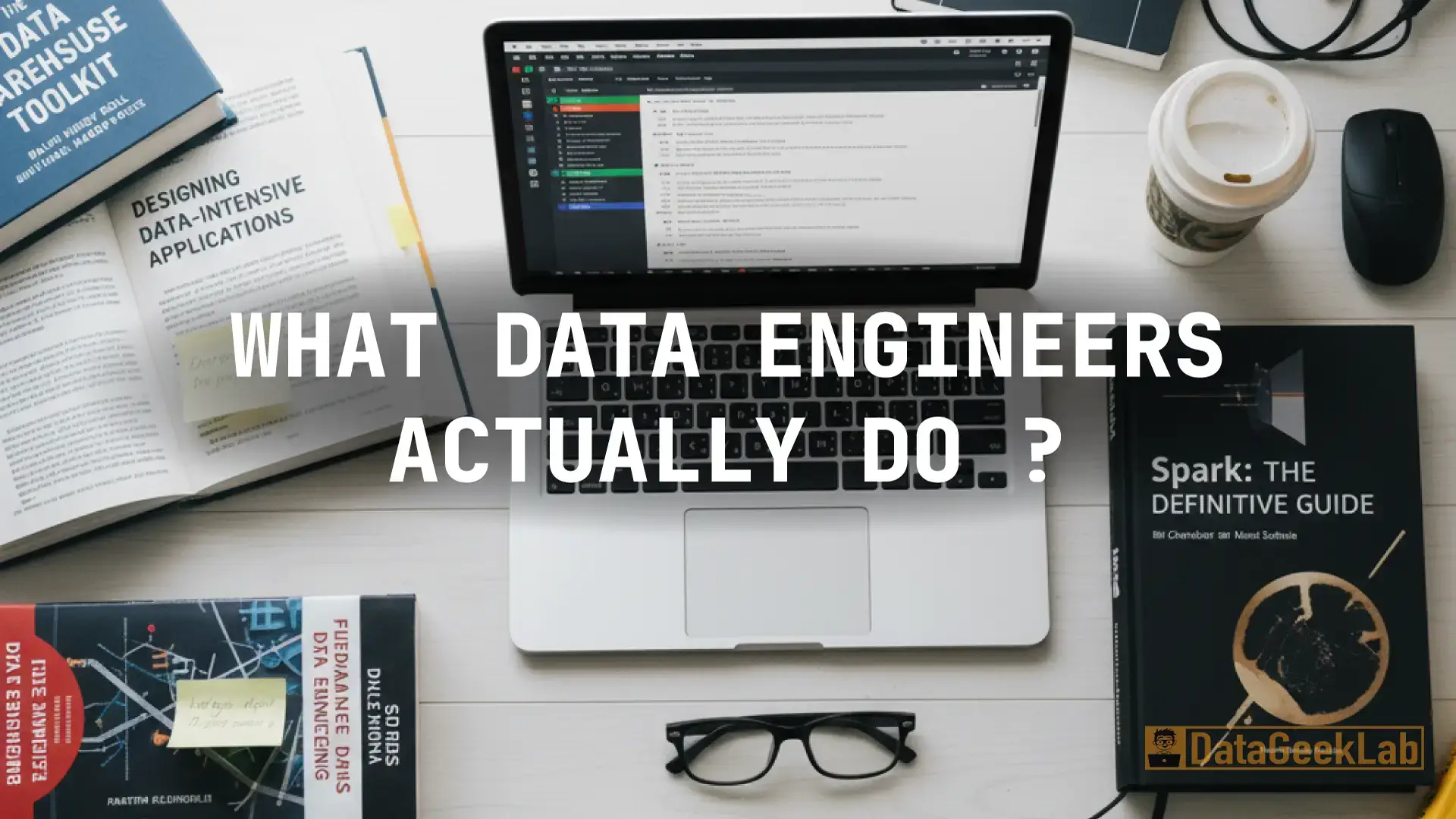
2 thoughts on “What Data Engineers Do: Surprising Skills, Coding Demands & Core Responsibilities”